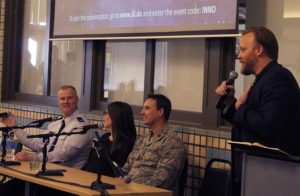U.S. Air Force and Space Community Discuss U.S. Air Force Changes and Their Impacts
Colorado Springs, Colo – Feb 20, 2020 – The United States Air Force Research Laboratory Space Vehicles Directorate’s Catalyst Space Accelerator (CSA) hosted 130 people from around the nation in its third Community Day. Sponsored by the Colorado Office of Economic Development and International Trade (OEDIT), the event was a day-long conversation about the United States Air Force changes and their impacts.
With a lineup of 15 speakers and panelists, including retired U.S. Air Force Lt Gen David Buck, and several networking breaks, the day provided ample opportunity for the space community to discuss the coming of United States Space Force (USSF) and what it means for the U.S. Air Force.
“There’s this fake thing that we’re all afraid of,” said Buck. “A fake adversary, and this fake adversary is risk. And because of this, we can’t go fast.”
As USSF becomes a concrete reality, and as data becomes central to the space domain, the discussions around rapid innovation and commercial tech couldn’t be more relevant for CSA’s Data Fusion cohort.
David Blanks, Air Force Research Laboratory (AFRL) liaison to USSF, spoke to the importance of technology development in the commercial sector: “Not for technology’s sake. The use of commercial technology has to be to enhance that mission, and that’s where we get back to data.”
Now Space: Normalize, Optimize, Win.
Keynote Speaker Lt Gen (ret) David Buck, now President and CEO of Buck Consulting Group, advocated for what he called “NOW Space”: Normalize, Optimize, and Win in space.
To do that, he said, the U.S. Military needs to “take space services and make them a routine. Like an airline, servicing your car, using your smart phone or accessing the internet.” And “partnering with industry is a must-do” because industry, said Buck, has “the capabilities to provide non-traditional solutions.”
Amidst an open floor for questions from the audience, Buck also gave insight on what role USSF will play in warfighting, and how it will work with the U.S. Air Force.
U.S. Space Force, he said, will likely be smaller than the other services, but this brings inherent agility. It will have ability to train its own warfighters and maintain readiness. “We’re going to grow indigenous space intel professionals. We’re going to get you, train you, and have a career track for you.”
USSF’s operational focus will be Orbital Warfare, Electronic Warfare, Battle Management, and Access and Sustainment. The U.S. Air Force will work closely with USSF in Logistics, Plans and Requirements, and Mission Support.
“A core takeaway is that we are going to take advantage of indigenous capabilities in the U.S. Air Force,” said Buck.
The Urgency of Winning Space
A representative from the Intelligence, Surveillance, and Reconnaissance Directorate, Headquarters USSF spoke to the urgency of developing U.S. space capabilities. According to this representative, Russia, China, and Iran are all developing their own, and they pose real threats to U.S. space assets at all levels: “space, ground, and link/command.”
One panel spoke to the importance of making both U.S. Air Force and USSF the kind of organizations that will win in space. “We have to convince people that U.S. Space Force is something that is long-term, that it’s not going to go away,” said Mike Pierson, Chief of Public Engagements at HQ USSF. Maj Gen (ret) Jay Lindell, the Aerospace & Defense Industry Champion with OEDIT, added, “The combatant unified command, U.S. Space Command is an important basing decision for Colorado. US Space Command generates the capabilities and requirements needed to defend the nation in the space domain. Businesses will cluster to where those requirements are generated to help inform what is technically feasible as well as the timeline and cost to provide capabilities. It is a mutual, enhancing relationship for the Command; great for defense, great for business, great for Colorado.”
According to Bill Woolf, Executive Director of the Space Force Association, U.S. Space Force needs to take the aspects of U.S. Air Force culture where “the Captain or Technical Sergeant who has to accomplish the space superiority mission stands in front of all the generals and says, ‘These are the capabilities I need to accomplish this mission. Don’t ask me to do my mission until I have these capabilities.’”
The Winning Ingredient
Advanced technology doesn’t matter if it doesn’t get to the warfighter. But getting it to the warfighter isn’t easy when the approach to innovation is siloed. AF CyberWorx Director, Col William Waynick, put it succinctly: “We have lots of innovation capabilities/cells in the Air Force. Ideally, we need to normalize innovation where it’s part of our daily lives and not something special we do. The ability to scale innovation across the Air Force is something I would love to know how to do.”
Maj Rob Slaughter, Director of Platform One, said that when he joined the Air Force in 2012 they faced this problem of not being able to get the technology they needed: “I see you and you see me, but I have no idea how to get you on contract.” But things are changing. “All of us here,” said Slaughter, “everyone in this room, are about closing that gap.”
To Slaughter, fast and flexible contracting is one answer to the problem. “My favorite tool right now is the AFWERX Open Topic,” a method for small businesses to bring their ideas to the U.S. Air Force and potentially get on contract quickly.
But better contracting tools are not the only answer. “To me, as an organization as a whole,” said Slaughter, “you have to ask how you can do a better job of retaining the people you have. The longer we keep people, the more people we can affect.”
A final panel for the day, filled with leaders in the Colorado Springs community, spoke about the impact of locating U.S. Space Command in Colorado Springs, and why it makes sense: “The State has invested a significant amount of money in local infrastructure,” said Col (ret) Ron Fitch, UCHealth Southern Regional VP for Operations and Military Affairs. Donald Addy, Chairman of the Colorado Thirty Group (CTG) added, “We must not allow interruptions of our space defense assets to occur simply for the purpose of relocating to some other location.”
The CSA is seeking to address multiple issues when it comes to getting innovation to the warfighter. The Accelerator’s eight cohort companies, all with technology centered around data fusion, are being given the resources they need to develop their technology and transition it into the military. Visit the CSA’s website to read more about the Accelerator and its current cohort.
About Catalyst Space Accelerator
The Air Force Research Laboratory Space Vehicles Directorate’s Catalyst Space Accelerator is a NewSpace-focused defense and national security industry accelerator, headquartered on the Catalyst Campus for Technology and Innovation (CCTI) in Colorado Springs, Colorado. CCTI is a collaborative ecosystem where industry, small business, entrepreneurs, startups, government, academia, and venture capital intersect with Colorado’s aerospace and defense industry to create community, spark innovation and stimulate business growth. The Catalyst Space Accelerator is a collaborative program hosted by CCTI, a Colorado 501(c)3), funded by the Air Force Research Laboratory’s Space Vehicles Directorate with current corporate sponsor, Microsoft, to provide a robust, mentor-driven curriculum for accelerator teams.
For more information:
Catalyst Space Accelerator Media Relations
Mrs. Dana Speed
dana.speed@catalystcampus.org
719-394-0606




